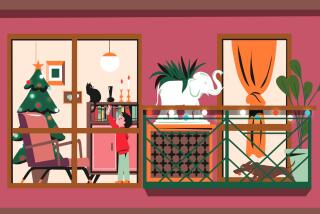Public Is Beginning to Compete in the Olympic Pinheads’ Game
- Share via
CALGARY, Alberta — At a Valentine’s Day brunch, ABC gave little red heart-shaped pins with the network’s Olympics logo to 40 advertiser guests. By nightfall, the limited-issue Valentine’s Day mementos were fetching as much as $100 apiece on the streets.
Toward the end of a lopsided hockey match here the other night, bored spectators in the Saddledome turned away from the play on the ice and began to swap and sell souvenir Olympic pins busily.
From hotel lobbies on Calgary’s sidewalks to two “pin trading” centers across from the downtown Olympic Plaza, this bartering has quickly become the favorite participant sport of the Winter Olympics.
Most of the more than 7 million enameled souvenir pins in about 600 designs that are being sold or given away by national Olympic committees, corporate sponsors and news organizations have no more intrinsic value than the trinkets in Cracker Jack boxes, which they resemble. Still, more than 15,000 people a day file into Coca-Cola’s trading bazaar in a 22,000-square-foot heated tent. Often there are long lines to get in.
Inside, they will stand for hours bargaining over such matters as the worth of the Calgary organizing committee’s cloisonne snowflake pin, compared with the value of, say, a cutout of the 1988 Winter Olympics mascots-smiling polar bears named Hidy and Howdy.
Public Joins the Game
For years, Olympic athletes have swapped badges and national pins among themselves as tokens of friendship. But since the 1980 Lake Placid, N.Y., Olympics, the public has joined in the game in a big way.
The trend has accelerated with the intensification of corporate involvement in the games. There are now pin-collecting clubs and newsletters. The pins in greatest demand are those of limited issue or those that were recalled because of mistakes. The Los Angeles Olympic Organizing Committee stopped production of a pin showing Sam the Eagle, the Los Angeles Olympics mascot, holding a Coke because it was regarded as too commercial. That pin is now selling for as much as $1,700.
This year, young and old, male and female, blue-collar workers and executives, North Americans and East Europeans, all are playing the game. Employees of Time Inc. have been amazed by the zest of one corporate vice president who has been seized by the pin-collecting mania.
Britain’s Princess Anne and International Olympics Committee President Juan Antonio Samaranch have both stopped by the Coke tent to observe the trading firsthand.
“I made myself a trade with a gentleman from Switzerland who spoke no English, and I speak no French,” bragged Mark Preisinger, a spokesman for Coca-Cola, the official Olympics soft drink sponsor.
Pinhead Obsession
What obsession is it that drives the “pinheads,” as they call themselves, to cover their hats and parkas in pins? What causes them to stand in line to pay $5 for a half-inch Maxwell House Coffee pin or offer up to $2,000 to the Calgary police officer--who isn’t selling--for her Olympics security forces badge No. 1988?
“It’s a great way to meet people and interact with crowds,” said Kelly Klatt, a Los Angeles Police Department sergeant who took four weeks’ vacation to come up here and sell and swap pins.
“It’s very impulsive,” his wife Samantha added. “Very shy people become outgoing. I’ve never seen men purchase like this. Everybody will go home weighted down with them and say, ‘What do we do with them now? Put them in a drawer?’ ”
The Klatts do a brisk business in Los Angeles Police Department pins from the 1984 Olympics; they also swap pins with emblems of the State Department and the White House for 1988 Winter Olympics souvenirs. Kelly Klatt said he brought up 64,000 pins. His three children, his mother-in-law and her friend are coming up later to help out in the selling and swapping.
“I tell you something, there’s going to be divorces over this business,” said Julius Josza, a Calgary auto mechanic who has a pin stall across from the Klatts in B.J.’s International Pin Trading Center, a flea market of 20 pin vendors in a three-floor storefront a few yards up from the Coke tent.
“I’m on this side and I hear,” added Josza, standing in front of a sign that read “Pin Freak.” “I’ve heard the wife saying, ‘What are you doing? You’ve already spent $1,500 from the savings account on pins.’ ”
Patient With His Addiction
Josza’s own wife, Gladys, is patient with his addiction, which they said began about three months ago when the pin trading first started in Calgary. He bought her one of the heart-shaped ABC pins for Valentine’s Day.
The Klatts and the Joszas pay about $37.50 a day for space they sublease from “B.J.”--Bill Hipson, a Calgary novelty pin manufacturer who got Pepsi to promote his venture and has been in endless legal scrapes with the Coke people down the street.
Coke does not allow traders in their tent to charge money for their wares, although the company sells official Olympic pins for $3.75, a “Pin Collectors Guide” for $8.50 and a swath of felt cloth, a “Trading Scarf,” for $9.
Hipson said he doesn’t mind if money changes hands at his emporium. “In our lease, we said, ‘Behave yourself; if you’re drunk, we’ll throw you out; outside . . . it’s your own business.”
Viktor Cornell, a retired New York City cab driver, is one of the veteran collector-vendors. This year, as a gesture to Calgary’s cowboy image, he wears his pins on a white 10-gallon Stetson. In the official book of the 1984 Winter Olympics in Sarajevo, there is a photograph of him in a black beret covered with pins. His business card identifies him as “collector of materials relating to the Olympic Games.”
Scoff at Amateurs
Czechs, Hungarians and Poles in green-tinted glasses hovered around his stall. They all scoffed at the amateur traders, saying most of what they buy, especially the corporate pins, are worthless. They are in the market for athletes’ badges and--most coveted of all -- Olympic medals.
One of this coterie, who identified himself as Frantisek Chalus, an engineer from Czechoslovakia, pulled out a sheaf of photographs of medals going back to the first modern Olympic Games in 1896 that he claimed are in his private collection, pieces of which, he said, he has donated to the Olympics Museum in Lausanne, Switzerland.
“It’s no Coca-Cola badges,” he boasted in halting, heavily accented English. “All are official badges.”
Where does he get them?
“I have friends,” he said mysteriously.
More to Read
Go beyond the scoreboard
Get the latest on L.A.'s teams in the daily Sports Report newsletter.
You may occasionally receive promotional content from the Los Angeles Times.






